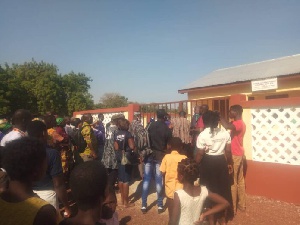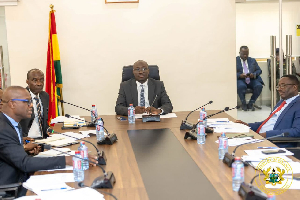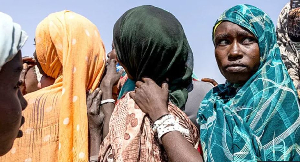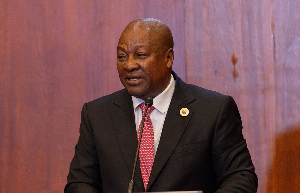A traditional chief at Achanyeri-Jaata, a rural community in the Builsa North District, has linked what he describes as a worrying low school enrollment trend in his area to family planning, saying “there are no children in the community again” as a result of the orthodox birth-control method.
Nab Gariba Ayeribey Apasugbey registered the complaint during the handover of an Early Childhood Development (ECD) block jointly provided for some deprived pre-school children in the community by the Participatory Action for Rural Development Alternatives (PARDA) and a foreign donor affiliate, Children Believe (CB), formerly known as Christian Children’s Fund of Canada.
The chief’s statement followed an appeal made at the ceremony by PARDA and CB to the members of the community to enroll and keep their children in school. Whilst showing gratitude to the donors for providing the facility, which he said would bring so much relief particularly to the young beneficiaries, the chief also stressed the need for families in the community to produce more children to fill up the vacuum he said had been created through family planning within the teaching space at the Achanyeri-Jaata Kindergarten and Primary School.
“Schoolchildren population is declining because of family planning. It used not to be like that when our families were producing as they should. Now, doctors have brought this family planning and women are not giving birth again. Because of the family planning, there are no children in the community again.
“We are told to do well by sending our young children to school. I’m equally pleading with our women to also try and give birth. If they don’t give birth, how is the school going to be filled with children? Some of the young men, too, have been sleeping around; they don’t want to bring women home and marry. How, then, do we get children in the community to fill the school?” he commented in a serious speech that tossed a section of the audience into laughter.
A representative of the Upper East Regional Education Directorate, Sumaila Shaibu Gandaa, lauded PARDA and CB for assisting the school and spoke of plans on the part of government to reconstitute School Management Committees (SMCs) to help head-teachers properly run the schools entrusted to them.
Mr Gandaa, an officer in charge of statistics at the directorate, also responded to the chief’s birth-control concerns, saying low enrollment figures at a school might not necessarily be linked to family planning in any community but could be as a result of children’s preference for a different school in a different community for some reasons.
Schoolchildren were learning in teachers’ private rooms until ECD block was provided
Authorities at the school say the kindergarten schoolchildren were being taught in private rooms meant for teachers to live in as the children did not have a classroom block of their own.
The children used to sit on the floor because the improvised classrooms were too small to accommodate them together with their furniture. The head-teacher, Timothy Awiah, told Starr News he met things in that state when he arrived at the school on transfer in 2008— twelve years ago. And so it was until the plight of the current generation of schoolchildren came to light.
“Let’s make sure these children enjoy this facility. I want to appeal to everyone to take care of the facility. We are handing it over to the traditional leaders and the people of this community. Again, I wish to entreat the Ghana Education Service to assist this community with early childhood educators so that we can use this community as an example for other communities. We would be disappointed if, when we pay a visit, a child has been taught but still cannot pronounce his or her name at age four or age five.
“Traditional leaders and people of this community, please, help the teachers to help the children. And remember, if any teacher abuses a child, PARDA will not take it kindly. And if you are a parent, do not abuse the teachers because they have not done A or B, and do not abuse the little children because they have the right to live and they are our future. We thank you for accepting us into your community and we pray that you’ll be able to grow and develop your children as you grow along,” the PARDA’s Executive Director, Dr Michael Wombeogo, remarked when the newly constructed ECD block was officially handed over to the community.
The CB’s Country Manager-Programme, Esenam Kavi De-Souza, in a speech read on her behalf by the Communications Manager of same outfit, William Anim-Dankwa, said the CB had delivered over 38 ECD centres so far in a number of communities and had plans to provide more.
“Before the construction of this centre we are about to commission, the people of Achanyeri-Jaata were in dire need of a place of effective teaching and learning for children aged between zero and four years. Today, we can heave a big sigh of relief, to the glory of God, that we have an ECD centre that befits our pre-school children’s needs. It is equipped with play, teaching and learning materials.
“CB has provided over 38 ECD centres with play equipment and adequate furniture. However, many of the facilities have not been maintained at all. Many of the play equipment do not last for two years. This facility should not go the way of others. Very soon we will be congregating at Saboro (a community in the Kassena-Nankana West District) to commission another one. We call on all stakeholders to play their part in ensuring that the children are in school, the materials they need are provided and the teachers are available to support. If we are able to play our part today, tomorrow’s children will be able to do more and bring the industrialisation and the development we need to our communities,” said Mrs. De-Souza.
Regional News of Friday, 4 December 2020
Source: starrfm.com.gh













